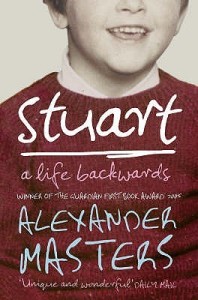Warning: I use language in this review.
I don’t know how to sum this up. It’s not the typical book I read, but then again, this isn’t a typical biography. Most biographers hold their subjects at arm’s length. That’s the rules, normally. But Stuart (the subject) and Alexander (the writer) are buddies, and not only is Alexander in the book, but Stuart is reading it along with you. The first line is “Stuart does not like the manuscript.” As a matter of fact, “It’s bollocks boring.” Which I think in American is “this shit sucks”. Stuart wants his autobiography to be a bestseller, “Like what Tom Clancy writes.” So Alexander starts over. And he takes Stuart’s advice, to write it backwards, to make it interesting.
Here is the link and here is the blurb:
In this extraordinary book, Alexander Masters has created a moving portrait of a troubled man, an unlikely friendship, and a desperate world few ever see. A gripping who-done-it journey back in time, it begins with Masters meeting a drunken Stuart lying on a sidewalk in Cambridge, England, and leads through layers of hell…back through crimes and misdemeanors, prison and homelessness, suicide attempts, violence, drugs, juvenile halls and special schools–to expose the smiling, gregarious thirteen-year-old boy who was Stuart before his long, sprawling, dangerous fall.
Shocking, inspiring, and hilarious by turns, Stuart: A Life Backwards is a writer’s quest to give voice to a man who, beneath his forbidding exterior, has a message for us all: that every life–even the most chaotic and disreputable–is a story worthy of being told.
After all, Stuart is not your typical subject for a biography. Alexander met Stuart while he was drunk and begging on the streets of Cambridge. The next time he meets him is at a campaign to free two social workers that have been arrested because homeless were dealing drugs in a shelter. The attempts to right this social wrong is where their friendship begins.
Stuart is what Alexander calls “a chaotic” and the kind the social workers try to help: a violent, homeless junkie, an alcoholic, a victim of sexual abuse, a mental patient, a criminal, and a sufferer of muscular dystrophy and self-harm. I saw the movie and watched an interview with Tom Hardy, who played Stuart. He said it perfectly. When it comes to Stuart, there are a lot of gongs to ring. But despite all the crime, the life on the street, the time in mental health or prison facilities, Stuart has another side, and it’s not at all what I was expecting. For instance, he takes his son to task for having a rude message on his outgoing answering machine. He believes politeness is important. He is an advocate for the homeless (being one, who better to speak for them than a member of that fraternity) and he tries to teach the “middle class” (such as Stuart and the other members of the campaign as well as the local Member of Parliament) things they just don’t understand about helping the homeless: how the increase of puppies and the limited space for homeless with pets leads to increased deaths during winter, the limited storage space in jail, and how to make convict curry. He tries to make his suicide attempts look like murders or accidents because his brother committed suicide and he doesn’t want his mother to go through that again. In other words, he’s a conscientious chaotic.
Despite Stuart’s violent temper, clashes with police, and penchant for knives, Alexander repeatedly refers to him as gentle and soft-spoken, insists that he has no fear of Stuart at all. They drink together, go shopping for furniture, eat a string of horrid meals, and Alexander accompanies Stuart to his court cases. Alexander even takes Stuart into the country to visit friends. All the while, he listens to Stuart’s story, for the book, and tries to show you what Stuart was, and then how he got that way.
Stuart is an enigma. I don’t know how to sum up this book. How do you sum up a life? I don’t think you do. I think you just read Alexander’s attempt – and it took a whole book. A very engaging, well written, funny, intense, sad, heartbreaking, enlightening and occasionally dirty (as in “dude” humor dirty) book. I don’t read much non-fiction, and it’s rare I recommend it to people – but I strongly recommend this book. I’ve always said that is one of the best compliments you can give a book. But the very best thing you can say about any book is that, at the end of the day, I’M glad I read it. Is reading books good for you? I think it must be. I don’t think you can read something that moves you and not be affected by it, or bettered by it. I think I was bettered by reading this. I think a lot of people could be. If nothing else, it makes you think about the nature of compassion; towards those people you walk by. What are there stories? How did they end up there? What could be done for them, what can they do for themselves? And, how is it that I am not among them? What is so different about me?
